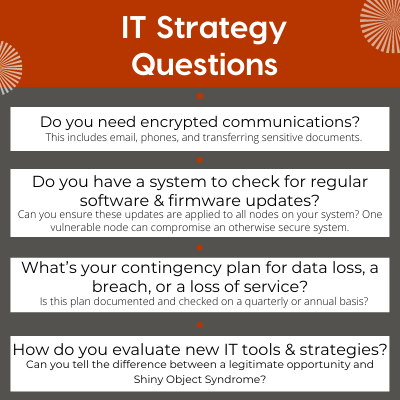Are you trying to determine if a managed service provider (MSP) is right for you? Maybe it would be helpful to understand the relationship with your current IT provider better?
There are two very different types of managed IT services: the Mercenary service provider and the Strategist service provider. Both approaches have something to offer, but it is important to understand the needs of your business in comparison to the strengths (and weaknesses) of each approach.
Wherever you might be, let's look at how you might identify a Mercenary versus Strategist approach to managed services and which might suit your business the best.
What is an IT Strategy (and why does it matter)?
An IT Strategy is exactly what it sounds like: a plan for the future that will help guide decision-making in relation to business outcomes supported by technology.

Ultimately, your IT strategy needs to address these components. Once you have your IT strategy, it is time to decide which approach to managing that IT strategy will work best for your business: the Mercenary or the Strategist.
The Mercenary
The MSP Mercenary is a managed IT service provider that is brought in on a per case or as-needed basis. If you have precisely defined IT needs, relatively simple IT needs, the ability to oversee someone operating in this role, a Mercenary is someone that can work best for your situation.
The pros of the Mercenary approach:
- They are often quick thinkers. Mercenaries are good at being dropped into a variety of emergency scenarios and getting things back up and running.
- They have a well-defined scope of expertise. These MSPs typically are good at specific tasks or objectives due to years of experience.
- Expedited projects. Due to a focus on project work, they can be helpful in standing up new systems, migrations, or many other focused one-time projects
The cons of the Mercenary approach:
- They aren’t forward-thinking. With a mercenary philosophy, they rely heavily on experience from the past to dictate how they resolve an issue or recommend a solution. The urgency of the moment, paired with a heavy focus on past technology, may lead to a lack of focus on the bigger picture of IT.
- They can get pricey. While we all should be conscious of the cost of our solutions, the Mercenary approach will tend to look for the least expensive options that work in the moment with less care for the long-term goals of the business. A quick fix may be less expensive in the beginning, but costs can skyrocket should your business needs shift.
- They live by "set it and forget it." This phrase, along with "if it ain't broke, don't fix it," are key indicators of mercenary mentality. With this way of thinking, the Mercenary will tend to only check in or bring items up when there is an issue or a sales opportunity.
The lack of connection to your overall business and its strategy means a Mercenary struggles to position your organization as an industry leader—let alone being on par with your competitors. While the Mercenary service providers can be inexpensive on a per case basis, calling them in to fix bigger issues or to take on larger projects may wind up costing you more money long-term.
The Strategist
The MSP Strategist is your support system. The Strategist isn't limited to cyber security, remote monitoring, or managed cloud services. Instead, the goal of the Strategist is to align your technology with the growth and goals of the business. At Anteris, we believe in the Strategist approach.
If you are looking for a partner to help define your IT needs, have a complex set of needs, or need someone with greater ability to handle your managed services independently, a Strategist service provider may be a great fit for your organization.
The pros of the Strategist approach:
- They are high-level thinkers. These MSPs are great at taking the goals of the business and marrying them with the technology that best fits the long-term.
- They are constantly improving. There is a focus on continually making things better and the viewpoint "it ain't broke but can we improve it?"
- They utilize monthly management with projects. The Strategist works best over more extended periods where they can utilize historical data captured from daily management to make meaningful changes to the infrastructure.
- They excel with longer projects. With a desire to dedicate a specific resource, project timelines can be extended to accommodate the resource's time.
- They become a partner. A long-term relationship is the mindset of the MSP Strategist versus a one-time or limited engagement of work.
- They aren’t just a contractor. The Strategist approach is the most successful when viewed as the IT Department or an integral team member rather than just another contractor.
The cons of the Strategist approach:
- Your input is still required. The Strategist will bring problems and business opportunities to your attention. To be the most effective, however, you need to provide input to the Strategist. While you are not having to manage daily tasks, high-level conversations are still required on a regular basis.
- Emphasis is on value over price. Organizations should not hire the Strategist because they assume doing so will net large cost savings. Savings are possible, but when you choose to hire the Strategist, you are choosing to upgrade your IT management.
- Can they become part of the team? Trust is essential in effectively working with the Strategist. Including your Strategist in high-level meetings and any issues that arise is critical to getting the most from your Strategist. In turn, your organization needs to trust the experience and ideas the Strategist can offer.
- There is a time investment. Again, working with a Strategist is a relationship. Though you may need to put in time upfront and through high-level conversations, working with the Strategist will remove the strain of managing daily tasks.
The Strategist is truly a part of your organization. We believe this relationship is important to get the most out of the approach, but you may prefer a hands-off approach to IT management. Organizations that cannot devote time and resources to a high-level conversation on IT management may also struggle with the Strategist.
The list above is by no means exhaustive, and there is plenty to say about the need for both mindsets. However, this is an excellent place to start assessing if business needs could benefit from an MSP or if a re-alignment of your current MSP needs to be in your forecasted conversations. Additionally, we have drawn out a few questions below that will assist you further in your assessment:
- Do you need additional insight and perspective on your current IT infrastructure goals?
- Are there any projects or specific issues you would love some quick help on but not necessarily long-term management?
- Do you have a clear vision of the business goals but are unsure how to navigate the current technological landscape to accomplish those goals?
- Does your current managed services company seem to have components of both mindsets? How would they describe themselves, and does that align with your experience with them?
How can Anteris help?
If your business has specifically defined needs and someone in your organization can practice extensive oversight, a mercenary managed IT services provider can be a good fit for your organization. If you are willing to make a longer-term investment in technology or have complex and evolving needs, a Strategist is likely a better option.
Ready to learn what an MSP Strategist can do for your company? Whether your main concern is security, cloud infrastructure, managed IT support, or any other managed IT service, we can help. Schedule an appointment with us today to find out how Anteris can make technology freeing, not frustrating.





